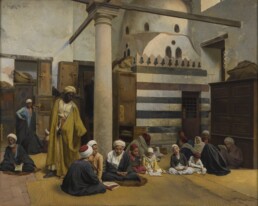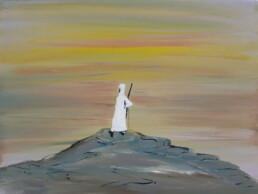The True Religion. Plain and Simple.
What is the Arabic (and Hebrew) term “deen”?
The law and the code you live by.
There are two questions to consider:
- Personal: Which code do you personally live by, that God will judge you by? (Of course, this also requires that you know that code and do not make assumptions about it.)
- Social/Political: Which code do you ascribe yourself to for social/communal belonging?
In the Quran 3:19, God says that the only code He recognises and accepts as an expression of subservience to His will is ‘the submission’, referring to the submission of Abraham, the first messenger of God to human civilisation - one of many contextual references can be found in Quran 2:127-134 or 6:158-165. ‘The submission', in Arabic merely a verbal noun, is presented as an ellipsis (the omission of speech or words that are superfluous or able to be understood from contextual clues).
God literally calls this method of submission as the ‘millah’ of Abraham (millah in Arabic being a code people hold to be revealed by God). The code was carried by Abraham’s descendants for approx 2600 years via the Hebrew Israelites, and then spread beyond them throughout the world via the Ishmaelites (and later on others) in the last 1400 years.
Who then is Muhammad? He is God’s final messenger from the Ishmaelites, upholding the code of Abraham his forefather, and delivering the final amendments of the Law to mankind. He is God's response to the prayers of Abraham and Ishmael, thinking of their descendants upon building the Ancient House at Makkah (then Bakka): "Send them a messenger from their own to deliver your signs (revelations) to them, teach them the scripture and wisdom, and purify them." (Quran 2:129) God's Law was first revealed to Abraham and then amended over thousands of years via 100,000s Prophets reflecting changing contexts and circumstances. The final amendments were eventually given to Muhammad.
So here we are today with the history of human civilisation behind us, revelation and the code to inform us as we look forward into the unknown future. It is all enough to guide us to live productive and contented lives with which we give thanks to the Most High, and flourish emotionally, psychologically, and physically.
In general, the contemporary Western Muslim is oblivious to all of the above, let alone a more detailed breakdown. The term Islam in today’s western context is a social marker of ethnic identity, and a political marker of minority identity. As a modern 'religion' it is the expression of ‘Millah’ of Abraham in a rudimentary 'village religion' which is over-simplified and mixed with folk religion. In everyday life, the sincere Muslim is a theist initiated into this culture. Their religion is taught to them with an ambiguously defined 'spirituality' inspired by ethno-cultural identity and norms - it ends up a desire for a theism and the spiritual coached in the ethnic and political familiar.
The true Torah/Nev’im/Gospel/Qur’anic faith - characterised by God as the “Faith of Abraham”, is truth. Today, Islam is the 'village religion' version of the Religion of Abraham which has skewed and misconstrued it on every level. Judaism and Christianity also started this way. Moses and Jesus were on the religion of Abraham, but those who later claimed Moses initially did to the Religion of Abraham what Muslims are doing now, until eventually it became Judaism. Same with those who later claimed Christ.
Are Muslims really taking the same wayward path like the other two? Yes, it seems so - it all starts with village mentality and folk religion, evolving into a separate entity. It should come as no surprise since the final Prophet of God said, "You will tread the same path as was trodden by those before, you inch by inch and step by step, so much so that if they had entered into the hole of the lizard, you would also follow them in this. His companions said: God's Messenger, do you mean Jews and Christians (by your words) "those before you"? He said: Who else?! (Muslim)
Some might argue that Islam is not village religion since it has a complex theology and legal formulations. Yes, but so too does Christianity and Judaism and that doesn't make them legitimate. Many systems of thought go off on a tangent and then become complexified, based on perverted views, by later generations. Ziyad b. Labid said: The Prophet mentioned something and then said, “…that shall be in times when knowledge (in the form of guidance) is gone.” I said: "Messenger of God, how shall (such) knowledge disappear when we recite the Qur'an, and have our children recite, and our children shall have their children recite it until the Day of Judgment?" He said, “Woe to you Ziyad, I considered you the most intelligent man of Madinah! Do not these Jews and Christians recite the Torah and Bible, but know little of what is in it?" (Ibn Majah)
In fact it's something to think about: nearly every time the Prophet would discuss the misguidance of believers, he would draw on the Christian and Jews as an example. Why? Because he was warning on the ways in which the devil perverts believers and draws them away from the religion of Abraham and into their own sect. And another point to note: the sectarianism God refers to in the Quran isn't the daft sects of Islam, but the sects of the religion of Abraham, namely Judaism and Christianity. Unfortunately, Islam is forming into an Abrahamic sect rather than standing as the religion of Abraham itself.
But the Qur’an as the final testament of God is a true and accurate representation of God’s will. For those who read it with the intention to actually understand it in neutral terms (in as much as they can) rather than sing its phonemes, then the above is all patently obvious.
So how is it most Muslims miss this? How is it that Christians and Jews don’t know this?!
Because some humans (with varying agendas) have clouded it and are committed to their new formulation, emotionally blackmailing sincere folk with godly aspirations to commit to unthinking, irrationality, and superstition. Simple.
What we need is no-nonsense faith - The faith of Abraham in clear and simple terms. In context. Reflecting its environment. Making sense.
The 'Halal Police' vs 'Haram Police'
There are many things that are strongly pushed as being haram (unlawful) and presented as a decisive matter, and to say otherwise in many circles amounts to heresy or the common ‘following one’s desires’. Whilst we ought to be tolerant it is unfortunate when interlocutors fail to exhibit the same. Rather than there being one decisive conclusion, most of these issues have been subject to much debate over a millennium, and often, the majority of scholars from all schools of legal interpretation have actually held views to the contrary. Rather than being 'mainstream' many of these views have been somewhat fringe.
I believe these issues ought to be addressed robustly (and I hope to do so over time), and that people should be educated about the different and legitimate ways in which the shar'i sources can be understood or interpreted. We need to do this not only because some restrictions cause unnecessary challenges to people’s lives, but because even the most mundane of issues can cause impediments to the progress of Muslims in wider society. There seems to be an active effort under way by those in the scholarly realm to restore some balance that has been upset by conflations, misrepresentations and an attitude that sees restrictiveness as godly. On the latter, Allah said: “Believers, do not ask about matter which, if made known to you, might make things difficult for you…” (5:101) The Prophet said: “The most criminal of Muslims are those who question things that are not prohibited, and consequently those things become prohibited because of their incessant questions.” (al-Bukhari and Muslim).
But the main point of this post is this:
In our redress, people should not assume this is a free for all. We are not the 'halal police’ who simply seek to make permissible that which God hasn’t. Nor must we do this with the simplistic excuse of making things 'easy' since taklif, that is legal obligation from God, necessitates that we will be challenged and one purpose of divine commands is to test the nafs. We must be moderate and take a composed and sensible approach:
- If the 'haram police’ go to one extreme, we must not go to the other with extremely far-fetched conclusions to present something as halal.
- If takfiris throw people out of Islam willy nilly, it doesn’t mean that everyone is a Muslim no matter what.
- If some believe we must be vehemently anti-government even when the govt does something legitimate, it doesn’t mean we must acquiesce to all policies.
- If one argues absolute taqlid of a cleric, it doesn’t mean that we become anti-madhab or anti-taqlid.
- If someone reduces the shariah to the hudud (capital punishments), it doesn’t mean we become militant secularists.
- If some advocate a modern day caliphate simplistically predicated on the mediaeval “age of empire” and view the world through the lens of post-colonial grievances, it doesn’t mean we negate the idea of an Islamic political philosophy/theory and notions of Muslim governance as a means of Muslim self-determination.
- If some are anti-Western it doesn’t mean that we hold every western cultural product to be appropriate for believers (this also goes for eastern cultures).
- If men mistreat women, it doesn’t mean we legitimate man-hating. If feminists argue for complete gender deconstruction or the fall of religion (viewing it as unjust patriarchal hegemony) it doesn’t negate the fact that misogyny exists and attitudes in most cultures need to evolve.
Most people who take positions at one end of a spectrum are usually reacting to something, but if we go to the other end, we’re also being reactionary. The nature of 'truth' is that it is not a reaction nor is it defined as the opposite of falsehood; it is an entity that stands independent, regardless of whatever else is going on.
As believers, we are not defined by our differences to the 'other', God has given clear guidance and we follow that guidance regardless of who happens (or doesn’t) to concur with it. Because of our commitment to it we feel no need to incessantly argue with others, we remain confident but humble, and proceed. Fiqh or aqidah for the laity exists to inform them how to live and remain in God’s grace, and not to argue. Even if you have no intention to do so, be on guard and don’t let others pull you in. Respond in the words of the wise, “God is our Lord and your Lord, to us our actions and to you yours, so let there be no argument between us and you. God will gather us together and to Him we shall return.” (42:15)
Reacting to change
Different people react to change and the unfamiliar in various ways. The odd lot enjoy the challenge and bizarrely relish the idea of having the rug moved from under their feet. Others hold on for dear life. Some subconsciously commit to their ways but only out of comfortability. By studying the lives of prophets who called those claiming faith back to the Lord of Abraham, we see that change has always involved strife and division, and such a consequence has been accepted for the sake of the greater good that lies beyond it.
Unfortunately we don’t live in a neutral space. It would be wonderful to deliver God’s guidance without simultaneously having to contend with misinformation and inanity that has led believers to spiral into unproductive places, or commit to ideas or ways that impede their progress. Often people don’t even know they’re in such places and so change seems unnecessary. Occasionally I highlight the situation (but without getting personal) only to dispel the idea things are anywhere near great. Others, due to age and maturity, recognise after years how they’ve been impeded wanting to make sense of how it happened and now what to do. Those with an ‘outsider’s perspective’ assume this is what I greatly focus on but I really don’t. Those with an ‘insider’s perspective’ around me and on our courses witness how we build things from first-principles, learn what God has said and are inspired by it, and study the logic of God’s directives. Our environment is one aspiring to positivity, godliness, civility, being accurately informed, and personal improvement (and understandably some simultaneously want to make sense of where it went awry for them over the years, some already know, and some started without baggage).
As an erudite student characterised it, “You show a mirror which no one likes and go a step further showing people that they are responsible for the disheveled reflection that they see. It’s not just about not talking of all the stuff that makes people feel fuzzy and euphoric, it’s the accountability and rectification that must proceed from facing the music, which is an excruciatingly painful process. You pull out the no excuses card, nothing to hide behind, no victimisation, no blame games. The mirror shows a reflection that people don’t like, not because God chose to withhold beauty from us, but our own lifestyle and choices have led to this shabby state. Who likes hearing that? Which in a weird way is actually a positive message. You’re not calling people ugly. You’re telling them there is so much beauty and potential for goodness to be extracted from them that its criminal to be content with the current state of affairs. Initially there is a blow to the self esteem, but eventually we should see that accountability will do us good. Much good.”
Some things are so ridiculous that simply pointing them out makes it seem like you’re ridiculing them. It’s not you but the nature of what you’re observing. The Prophet was adamant in bringing people together telling the early believers to spend on unbelieving families and to keep ties, but pointing out the Qurashi ways was enough for the notables of Makkah to tell his uncle, Abu Talib, “You give us your nephew who has rebelled against the religion you and your forefathers have followed, and has sown the seeds of discord among your people and ridiculed their practices.” (Ibn Hisham) This outrage is driven by the feeling of being impugned, irrespective of right and wrong. During the first emigration to Abyssinia Ja’far b. Abi Talib touchingly told the Negus of the decency the Prophet called for and how his people irrationally reacted.
Now some people assert that we mustn’t look to the Hebrew Prophets as case studies because 1) only Muhammad is an example, and 2) Muhammad was soft/lenient with his followers/co-religionists. Both notions are misplaced.
Firstly, God explicitly tells us that Abraham and others are an example to follow (see: Quran 60:4) and the entire point of telling us the stories of past prophets is to take them as examples (it’s not exactly meant to be entertainment). Additionally, such an assertion is only made by laymen - no theologian would ever state this.
Secondly, as a Prophet, Muhammad was not sent to his own believers but to pagans, but the Hebrew prophets were sent to those claiming to be Abrahamic believers. So in the context of this discussion, the Hebrew situation is far more analogous. But let’s not forget that Muhammad was just as decisive with his people (Quraish) as the Hebrew prophets were with theirs, and his own companions were deferential so he had little reason to be stern or provocative with them, but when the occasion called for such an approach with the newly converted he was particularly forthcoming.
Now when it comes to addressing the current situation and studying reactions the following prophetic examples are quite insightful. For example, Moses recognised priorities and that unity for the sake of it wasn’t God’s will, but Aaron misprioritised: “Moses said, ‘When you realized they had gone astray, what prevented you, Aaron, from coming after me? How could you disobey my orders?’ He said, ‘Son of my mother– let go of my beard and my hair!– I was afraid you would say, “You have caused division among the children of Israel and have not heeded what I said.” (Quran 20:92-24) Aaron did not deal with the problem out of concern of being blamed for ‘division’, but clearly that was a secondary issue for Moses.
In Matthew’s gospel, Jesus informs his disciples (in Arabic hawariyun - see Quran 61:14 for reference) to spread the word warning his Jewish disciples about their own co-religionists, that “I am sending you out like sheep among wolves; therefore be as shrewd as snakes and as innocent as doves. But beware of men; for they will hand you over to their councils and flog you in their synagogues.” (Matthew 10:16-17) The notion that change involves strife and division can be an unfortunate but foreseen consequence of change in the social world. Waraqah b. Naufal told Muhammad: “I hope to live to see your people drive you out.” The noble Prophet asked, "Never did a man come with something similar to what you have brought but was treated with hostility. If I should remain alive till the day when you will be turned out then I would support you strongly." (al-Bukhari) Similarly, the consequence of change was anticipated by Christ: “Do not assume that I have come to bring peace to the earth; I have not come to bring peace, but a sword. For I have come to turn ‘a man against his father, a daughter against her mother, a daughter-in-law against her mother-in-law. A man’s enemies will be the members of his own household.” (Matthew 10:16-17) Christ’s point wasn’t that he intended to cause this, but that it would be an unfortunate consequence given the nature of the Children of Israel and their antipathy to change.
But these consequences have little to do with the person pointing things out.
They are reactions and thus in the hands of those called to change - it’s up to them how they react and what they make of the situation. If things are negative or divisive then that’s because onlookers have chosen to make it so. It’s about their perception. In part, the tales of the Children of Israel in the Quran is an intended lesson to believers: one can either transcend his/her sensitivities for the greater good and for the sake of God, or otherwise react like the Children of Israel, “Whenever a messenger brought them anything they did not like, they accused some of lying and put others to death.” Note that it was what “they did not like” - it was a matter of their perception. God shows us that one can choose to focus on the actual message like the sincere to God who were called to truth over millennia (like the sahabah or the hawariyun), or intentionally avoid the change by making it about the caller like the people of Noah: “But the leading disbelievers among his people said, ‘He is merely a mortal like you, trying to gain some superiority over you.’” (Quran 23:24) Rudeness is culturally defined, what some find offensive others do not. But the Prophets were certainly provocative as every narrative relates, and in this era of public noise and confusion drowning out what is sensible, people need provocation to steer another direction. A person chooses to put their sensitivities first viewing a well-intentioned nudge as negative, or they’re happy for something that will help them grow putting their heightened sensitivities away.
Different people have different goals. Ours is change and holistic realignment, with deep educational and critical engagement. We want believers to be the best they can and I personally don’t believe that can happen without being good with God, God being good with them, and then understanding what it is that God actually wants. Some are so unthinkingly committed to the familiar because they’re afraid of what they don’t know or initially recognise that they resort to spreading mistruths about others out of desperation. We shouldn’t be led by their insecurities but by our own confidence. Putting aside technical shar’i discussions on ‘accuracy’ and ‘authenticity’ which most are not equipped to ascertain, merely glancing at the Muslim condition tells you that things aren’t working. Simplistic explanations such as we’re not ‘blessed’ are wrong, the shari’ah has a material/worldly function which isn’t being realised. Generally, I don’t believe that the ‘outside’ world is to blame (the Prophet taught that it will always be the way it is), and in all the analysis of how things are, seldom do people or analysts critically and strategically address the condition of believers from first-principles.
Change is the hardest social objective there is and its leaders seldom escape demonisation - it's par for the course. Popularity is easy and many know full well how to get millions of followers on social media and how to be loved by everybody - it’s easy to see what appeals to the popular Muslim psyche. But then it makes everything about quantity rather than quality turning our endeavours into superficial popularity contests. Of course, being popular is nice and intuitively what we all like, but there are necessary tasks with which popularity will always remain in tension.
If we seek positive realignment (islah) and improvement then we cannot afford to react like peoples of the past:
“Their messengers came to them with clear proof, but they tried to silence them saying, ‘We do not believe the message with which you were sent. We have disturbing doubts about what you are asking us to do.’ Their messengers answered, ‘Can there be any doubt about God, the Creator of the heavens and earth? He calls you to Him in order to forgive you your sins and let you enjoy your life until the appointed hour.’ But they said, ‘You are only men like us. You want to turn us away from what our forefathers used to worship. Bring us clear proof then.’ Their messengers answered, ‘True, we are only men like you, but God favours whichever of His servants He chooses. We cannot bring you any proof unless God permits it, so let the believers put all their trust in Him. Why should we not put our trust in God when it is He who has guided us to this way we follow. We shall certainly bear steadfastly whatever harm you do to us. Let anyone who trusts, trust in God.’” (Quran 14:9)
A thought on intelligence and the faithful
It’s hard to keep track of time these days but we know we’re getting older. So are the kids. Despite being young our generation will soon be gone and the future will be theirs. But what future are we passing on? What kind of existence are believers living today? What have we fallen into? It’s not a matter of ‘catching up’ but being ahead, exuding confidence in what is actually superior (rather than misplaced confidence in the absurd), and with agility staying ahead of the curb. The Quranic sabiqun (see 56:10) engender this: those at the forefront driven by their imaan (affirmation and sense of trust in God) and high achievers in whatever they do, as God wills. “They are the closest (to God.)” (56:11)
But this is not what people are commonly taught is from God.
We’re frequently told that God put us on earth, only for the akhirah (afterlife). This idea is then commonly presented in a way that suggests people need not concern themselves about life on earth. Or their happiness. Or their worldly productivity. Material acquisition is pointless because life is just momentary, wealth is distracting, “You’ll be rich in Jannah”. Every lawful aspect of life, especially by those who cannot perceive of achieving them, is deferred to “Jannah” as an excuse to mitigate the duty to excel in the now. Believers need not put in effort and excel, plus resources count for nothing. (Even in the realm of shar’i learning some YouTube videos suffice.) The power and influence required to safeguard a shar’i environment will simply descend from the heavens - or by protesting with placards. Apparently there are no social and physical causal processes, it is not actions that fundamentally breed results. Everything will simply be the result of ‘blessings’ that come about from the ‘correct’ creed, observing restrictions, and ritual worship.
The creed? Well it’s all based on resistance. We must resist ideas, resist politics, resist everything. Often we don’t even know why we’re being resistant! We know what we don’t stand for, but we’re not quite sure what we do stand for. Besides the fact this is unproductive, it’s all unnecessarily tiring. With all the focus on the negative, the positive hasn’t offered much meaningful direction. Adam popped into existence spontaneously but was also gradually fashioned from earth and kicked out of heaven (not sure how he got to Earth). God is neither here nor there, nor nowhere nor everywhere. God has eyes, two eyes, no eyes - everything or nothing “in a way that befits His majesty.” Say your “Quls” or the spirits will snatch your body. Or a witch/wizard will control you. Or someone’s eyes will get you. Science is evil. Vaccines don’t work.
The restrictions? Don’t show this nor cut your hair like that. Don’t wear perfume, shape your eyebrows or beards. Don’t enjoy yourself except with food, but most things you can’t eat (so overeat what you can!). Go to the mosque but don’t let the women in or you’ll be tempted to fornicate, maybe even in the mosque! Don’t take out that loan even if you need the capital, it’s like having sex with your mother. Don’t mingle with the disbelievers, but live in “their” country, obey “their” laws and pay taxes. Be frightened of God. Don’t say God, say Allah. Don’t be western. Don’t be happy, death is nigh. But smile, it’s sunnah…and “Islam is easy.”
And what is ritual worship? Holding prayer beads. Lots of units (rak’at) of prayer (salah). Reciting Arabic phonemes from a holy book. Hunger for a month. A two-week walking holiday in Saudi Arabia. Wearing ‘Islamic’ eastern clothing with western trainers, jeans and jackets. It’s all for God so don’t be critical.
“You know what your problem is? You’re just logical.”
Is this somehow meant to be a negative?! How has the level of conversation amongst those who have the Qur'an and ways of the final Prophet plummeted to this?
The reason I’m writing this (as when I write most things) is because a good and intelligent sister with righteous intentions put it, “This appeals to my intellect and sits with revelation, but how do I know I’m just following what I want to hear?” Subservience to God is not suffering and silliness. And the same can be argued by an unbeliever - is it not the intellect that they ought to rely on to see the truth of Abrahamic monotheism? And a disfigured patchwork presented as deen that sounds absolutely nonsensical is just that. The intuitions of many sincere believers will tell them that this is so, “but then again, if everyone is saying it who am I to argue?” But everyone isn’t advocating such absurdity and most of us know living like the above is no way to achieve anything. Such ‘religious' takes will never produce anything of value, neither in this life or with God in the hereafter - and it’s certainly not good practice to (mis)represent God’s will with such ugliness and expect favourable outcomes. Personally I’ve never come across anything so dissonance-inducing.
But what about the textual ‘evidence’ for all of this? Well anyone can offer evidence for the greatest absurdity. The Christians for Trinitarianism. The Hindus for paganism. The religious extremists for murder and mayhem. The way of godliness and the intellect is the way of Abraham and his progeny: Ishmael and Isaac, Jacob and Joseph, David and Solomon, Moses, Jesus and Muhammad. Our rational and godly philosophy remains, as expressed by the shar’i philosopher Ibn al-Qayyim, that “the foundations and edifice of the shari'ah are built on wisdoms and benefits to a person, in their living and (life) journey. All of the shari'ah is justice, mercy, benefit and wisdom. Every issue that goes from justice to oppression, from mercy to its opposite, from benefits to loss, from wisdom to imprudence, then it is not the shari'ah even if it is made to appear so through interpretation (of revelation)." (I’laam al-Muwaqiin) These judgements we make, as Ibn al-Qayyim infers, through the intellect. It doesn’t matter if it’s an eastern or western/northern or southern intellect - human intellect is human intellect with the universal capacity to reason. The believers in God and His messengers are meant to be people of intellect and reason. They are meant to be the civilised and elite. They have been gifted with guidance and wisdom (hidaya and hikmah).
Ibn al-Qayyim likewise wrote, "…the principles of the followers of prophetic guidance (Ahl’sunnah) in which is manifested the evidences of the Qur'an, sunnah, narrations, critical deliberation and intellect." (Kitab al-Ruh)
How have we come to a time in which we actually have to advocate the use of reason in order to determine what’s intelligent and what’s inane?
Permissive Monotheism
The purpose of the shari’ah is to fully realise human potential, to guide to that which is wholesome and uplifting. It is also to safeguard people from the excesses that lead to less-than-optimal outcomes, and in the least, bad ones. The problem we have in sectarian debates is where the line is (mis)placed, and unfortunately, it is often the case that restrictiveness is seen as the marker of God’s will and guidance. God is rather explicit about this matter, where He stands on permissiveness vs restrictiveness, and the attitude believers should take. Yet, preachers driven by ethnic and sectarian commitments and interests muddy waters that are in fact very clear.
So what is our philosophy towards life as God intended it?
In what has become known as ‘conservatism’, religious personalities mischaracterise God’s law as restrictive when nothing could be further from the truth. Literally trolling the masses, preachers tell them that "Islam is easy" whilst arbitrary rules or poorly thought-out assertions cause misery, hardship and a narrative that perpetually inhibits growth and human development, whilst denying them resources and unendingly bringing about worst outcomes – all shamefully in the name of God. I'm pointing out the obvious here – one only need study life outcomes of Muslim demographics to see this is the case.
“Football is shirk (polytheism)”
Yes, only if you have a very warped view of what polytheism is, and what offends God. This is the type of absurdity that becomes widespread when God is not part of the conversation.
So let’s bring the Most High back in: Does God eternally condemn a soul to the blazing fire for playing football according to rules? Is the Most High, Lord of all the realms and their inhabitants, deeply offended by paltry rules of a mundane sport such as football?! Does the Lord who sustains the cosmos take it offensively that you decided to give a yellow/red card for a handball or a tackle, and take it as you trying to compete with Him in His kingship?! God the Supreme is far above seeing a yellow/red card as a challenge to His divine station, or as seeking equality to Him. And any such silly representation of an ilah is certainly not Al-lah (a definite clause).
Neglecting God for the Prophet
Now one would think that the title, at least to a monotheist, would be pretty problematic. Yet to many Muslims (let alone Christians) it’s not the case. And even where they do not openly oppose such a sentiment, it still leaves them uncomfortable. Why? Because they’re told that to elevate God above all else is fine, but there’s an underlying sentiment that if their Prophet is not up there with Him then that’s plain blasphemy. Yet is it God alone who occupies the highest station, both in our practices and in our hearts, “Exalted be God, the true King, there is no God but Him, the Lord of the glorious throne.” (Quran 23:116)
Moving beyond village religion
I'm entirely devoted to the grand and civilisational way of thinking, talking about, and advocating, true subservience to God. By ‘civilizational’ I mean an understanding of true subservience which resonates with the experiences of those who live in an advanced state of human society, as opposed to villages.
As such, for many of us the time for ‘village Islam’ is over.
And yes, the distinction between village Islam (synonymous with desert-dwellers) and civilizational subservience to God has been made in both the Prophet’s time and later on by fuqaha (jurists). There are many hadith that explicitly speak to the distinction, such as, “The testimony of a villager against one from civilised society (urbanite) is not be accepted.” (Abu Dāwūd and Ibn Mājah, and there’s a discussion on its reliability)
Continuing with the distinction, the distinguished Hanbali jurist Mansūr al-Bahūti wrote about leading salah, ‘The urbanite, one who is raised in a city or town, is ranked above the villager, who is raised in a village, because most villagers are crude and have little knowledge of the injunctions pertaining to the rules of prayer. God said of the bedouins, “They are the least likely to know the limits God has sent down to His Messenger” due to their distance from those they may learn from.’
Al-Shāfi’ī provided a nuanced position in his opus Kitāb al-Umm that intimates how he saw it: ‘And if a villager leads an urbanite then it’s not an issue, if God so wills, except that I would like that the people of fadl take the lead in every circumstance of leadership.’ While taking every situation on its own merit, the latter part of his statement suggests that he saw those of fadl (superiority) as tending to be found amongst urbanites.
To be honest, village Islam was never appropriate for us. But economic migration, largely from poor or rural places, meant that it was inescapable. This is certainly not a value-judgement about that generation, but a wakeup call for THIS one. Civilisational subservience to God isn’t just deep knowledge and insight that integrates various fields of learning and enquiry, but it’s also an attitude and a vibe. A culture behind the thinking that becomes the basis of action.
For far too long Muslims have been palmed off with village Islam.
Even when so-called scholars try to present a pseudo-intellectual argument, it's merely village Islam with sources and citations. Village Islam is great for the village and being simple is perfectly fine, but that’s about maintaining a humble status quo that regulates basic impulses by providing simplistic solutions. It is nowhere near erudite or rich enough to provide the tools to build and advance as a community in sophisticated societies, and especially in our western context.
Yet your mosques and institutions socialise you with it, most preachers and teachers advocate it as a norm, and it's the basis for public engagement.
It's like the difference in business acumen and attitude between running a million/billion-pound corporation, and a market stall. Yes, you can make money with both but they're hardly comparable in terms of profit, power, and influence. Yet magical thinking has Muslims believe that the market trader, in the aggressive world of unfettered capitalism, has a hope. If this line of thinking wasn't so widespread and tragic, it'd make for an award-winning comedy show.
The difference between village Islam and civilisational Islam has nothing to do with orthodox vs liberal/progressive - a false distinction made in defence of village Islam, but the extremely variant levels of engaging with orthodoxy. In fact, village Islam doesn't need to engage with the details of orthodoxy because it's meant to be simplistic. It all goes wrong because village Islam is ill-equipped to engage at such levels of depth and analysis. Such intellectual inquiry is inherently a civilisational undertaking.
We reliably see its bad effects across the board. For example, many jihadists (for lack of a better term) want change. But because village Islam has no constructive content (it’s about maintaining a simplistic version of subservience) they reductively proceed to destroy what exists merely to replace it with a medieval village. Many callers for “sharia law” are the same – their conception of doing "sharia law" is simply to re-enact village living. Yet, as the Hanbali legal philosopher Ibn al-Qayyim put it in I’laam al-Muwaqqi’in, ‘Whoever gives fatwas to the people merely from what has been related in books differing from the customs, habits, era, social/political circumstances and contextual variables, misguides others and is himself misguided. His injury to the faith is greater than that of a doctor who treats patients inconsiderate of their different customs, habits, era, circumstances and contextual variables, merely seeking to reflect what is in the general books of medicine. Such a doctor is an ignoramus, and such a mufti too is an ignoramus; both are the most harmful they could possibly be to the people’s religion and their bodies – may God help us!’
The vast majority of Muslims are afflicted with this quandary in some way: we’re told that “Islam is the solution” but none of us can see exactly how a village approach will resolve our problems, or the world’s. And no, I'm not merely referring to geopolitics, or the way powerful states influence others, but even to matters closer to home.
For example, we're plied with populist preaching and 'heart softeners' as if they'll constructively provide us a consistent godly resilience in modern life. Resultantly, people are taught to confuse an emotional spike with a way of being and outlook that correlates with God's account of reality. Or we're told that a 'good believer' is always studying and then sold immaterial courses on the particulars of hadith criticism, or the works of Ibn Hazm - entirely academic undertakings absolutely irrelevant to a modern godly life which is what the pitiable participants were actually looking for.
A practical example is where we're told women should stay in the home, take care of the house, and obey their husbands. But the village lifestyle doesn't work for those who live in metropolitan conurbations where astronomical prices means both men and women are forced into the workplace. So what inevitably happens is that a women works a 9-5 then comes home and takes care of everyone and everything, whilst the man does little to share the domestic burden (although she's sharing financial burdens).
Now there’s a refined and nuanced shar’ī way to discuss these issues that'll probably offend BOTH liberal and conservative sensibilities, but we've certainly not had them. Instead its polarised: it tends to be either village Islam, or a rejection of village Islam for secular liberal sentiments. A civilisational (high) shar’ī conversation is by-and-large non-existent in the public space.
These are mundane examples (to some). But the truth is that there ISN'T a realm in which village Islam isn't having deleterious effects today.
From our conceptions of God and the Law, to personal wellbeing, politics, finance or society, village Islam not only rules the roost but increasingly worsens every situation or fails to provide the direction needed. It's for this reason that I don't actually blame Muslims in politics: where village Islam offers little by way of political theory one will inevitably be drawn to other interests (in the name of Islam) such as ethnic minority rights and multiculturalism. And those who don't, end up on the other side seeming to associate with right-wing conservatism. What's heartening is that the intentions of many are good, but activists simply don't have the tools.
But what do you do when your leaders are actually the same as you, and most are no more sophisticated than village elders, or behave like shaman?
Recognise it for what it is and move out of the village. If you're not ready to, or you find it unsettling because it's unfamiliar, then you're free to village Islam but you're in no place to advocate it as the complete notion of what the Prophets delivered from God, nor should you bizarrely view it as an ambition.
Unpicking for Christians and Muslims
Dear good Christian and Muslim friends, there is great confusion on matters of faith and what it means. Much of it has become jumbled, and the simple and unadulterated message of God is sullied by conflations and mischaracterisation.
Allow me to unpick it for you:
1. Small "i" islām which is simply an Arabic transliteration (because the final messenger was Arabian) of the word subservience/submission, and denotes subservience to God according to the religion of Abraham. Another word God uses in the final ancient Arabic message alongside small “m” muslim, is hanif. It is coherent, consistent and appeals to common sense reasoning.
2. Big "i" Islam which is a proper noun and denotes the modern religious phenomenon popularly called Islam. It’s a mix of folk religion, intellectually reductive debates, ritualism, Mohamedenism, a superstitious outlook, and often an insipid mechanism for social control.
3. Cultural Islam which is an ethnicity and advocates ethno-cultural norms. Highly secular, in the western political/public space it either advocates multiculturalism or post-colonialism, and is habitually concerned with BAME. rights.
Also, please let me be clear: I advocate the only true religion (number 1), the religion of Abraham, and the law revealed to him and his descendants, with the final amendments revealed to the last of God’s messengers, Muhammad, descending from the tribe of Kedar, the second son of Ishmael and the grandson of Abraham.
I do not care for foreign terms but substance, and whether we use Arabic, Aramaic, Hebrew or Abraham's Sumerian or Akkadian to name it, is inconsequential. However, since I write in the Anglophone realm, English is the natural go-to.
I do not call my big ‘m’ Muslim friends, nor my Christians friends to modern and cultural Islam which has become another sect of Abraham’s religion (alongside Judaism and Christianity). The story neither started nor was defined by either Jesus Christ nor Muhammad, but with their forefather, Abraham the friend of God.
I welcome a conversation about what we all equally claim:
That we serve the One True God Almighty according to the understanding of Abraham and His descendants.
I don’t believe any sincere Muslim or Christian disagrees with this and once it’s explained as to where things went wrong along time, I’ve never witnessed a person not take the basic but pure path, whether scholar or layman.
As has been the case for thousands of years, the Prophets taught that practical subservience to God is built on declaring one’s allegiance to God, offering ‘prayer’, the giving of tithes, fasting and pilgrimage to the ancient sanctuaries. Beyond these, true believers have always sought to uphold Abrahamic law and morality.
And as Brits, I believe we all ought to celebrate Britain’s rich and old connection with Abraham’s faith and seek to revitalise it (accurately) in this great land of ours once again.
The need for an Abrahamic overview
When we think of public ventures, we think of concentrated efforts in particular realms. The problem, however, is that such efforts can only be conducted fruitfully where we’re motivated by:
- an accurate understanding of our deen,
- what it means to be a Muslim and a true believer, and
- what shar’ī objectives precisely look like.
The sharī’ah is the key to human flourishing, normative guidance that works for all people, everywhere. As an abstract concept it is not centric to a time, a place or a people. It is guidance and a collection of standards that can be applied to any context: generating/producing specific solutions, remedies, or direction that's specifically action-guiding.
But Muslims in the West have narrowed the
scope of the sharī’ah of Allah and stripped it of its relevance. What God sent
as guidance in Revelation is for all of mankind. Yet we've created an “Immigrant
Islam” defined by its minority status and foreignness (for an extended
discussion on Immigrant Islam, see Sherman Jackson’s Islam and the Blackamerican). We have prioritised ethnic interests of representation (both social
and political) of immigrant Muslim communities.











